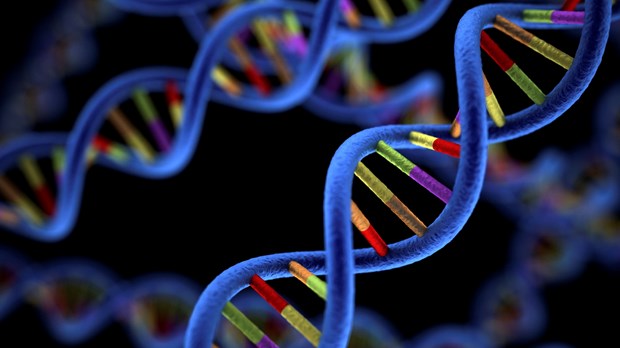What a Wonderful World

You are fearfully and wonderfully made! With more than 100 known elements in the universe, you are made of only 4. Your body is 96 percent oxygen, carbon, hydrogen, and nitrogen. And most other organisms share these elements with us. Isn't it amazing that such complexity and variety exist among living things as the result of combining only four elements in different ways?
Our bodies are just one mind-blowing element of God's impressive creation, all of which points directly to our Creator and teaches us about him. Hundreds of years of scientific discovery have revealed astounding depths of knowledge about our world, and yet in many ways we're still only just beginning to explore. Scientific exploration draws us toward a deeper appreciation of the unfathomable being who could create so much complexity—it moves us toward a deeper sense of awe and worship.
Consider plant life, for example. Plants use three of the elements found in our own bodies (oxygen, carbon, and hydrogen), plus the energy of sunlight to produce larger compounds. This process of photosynthesis is complicated and understanding it earned Melvin Calvin a Nobel Prize in 1961. But it wasn't until 1988, after 27 long years of additional research, that scientists understood the structure of RuBisCO, the enzyme required to initiate photosynthesis and the most abundant protein on earth (plants produce about 40 million tons per year). RuBisCO consists of a mind-boggling 37,792 atoms put together in a three-dimensional structure that will function only if every atom is in position. Our existence depends on this delicate balance.
Study of the natural world (God's "general revelation") allows us insight into the "how" and "when" of creation, but we rely on our holy book (God's "special revelation") to reveal the "who" and "why." These two revelations from God complement each other. Science can take us only so far before faith must step in and complete our picture of God.
Suspicious of Science?
When Christians talk about faith and science, many seem to worry that scientific research will somehow undermine their faith. This baffles me. Why would understanding how God created our world pull someone away from him? Why would understanding the painstaking detail of creation diminish God's power? The more we look at the amazing fine-tuning of the physical constants by which our world operates, the less we can ignore the Designer.
God created order in our world and allows us to discover it. Our inquisitive nature, our desire to understand and discover, reflects our being made in the image of God. We not only have an inherent urge to know our world, but we have the God-given inclination to appreciate the beauty of natural things and take pleasure in them. We can notice and be amazed by the expanse of stars at night, a luminous full moon, the colors of sunset, the sound of birds singing, the flavor of chocolate, the complexity of the human body, and even the miniscule detail in a cell or atom. In addition to scientific knowledge, there's incredible artistry in these things—God took pleasure in creating and gave us senses to perceive detail he built into nature.
The truths of our natural world are available for all to see and understand—even to those who don't believe in the God of the Bible but are seeking truth (Romans 1:20). Whether or not scientists acknowledge a creator, they conduct research with the premise that order is found in nature. As the scientific method finds and clarifies the elements of design by which our world operates, it's difficult to ignore the conclusion that there must be a Designer!
God's Fingerprints: Cosmic Discoveries
Technological advances such as the Hubble telescope and Cosmic Background Explorer satellite (COBE) allow us to see into galaxies light-years away and glimpse the universe in its infancy. In April 1992, astrophysicists and cosmologists around the world were excited by information from the COBE satellite providing evidence for what is commonly called the Big Bang theory, a cosmic beginning when the time-space continuum came into existence through a precisely controlled expansion from an infinitely compact "cosmic spore." Some likened this to finding "the Holy Grail of cosmology" or even "looking at God." Rather than drive people away, this evidence encouraged many astronomers and physicists to entertain the idea that God created the universe ex nihilo—out of nothing—as Genesis 1 describes.
A Loving God Revealed
Nature is a tangible source of spiritual inspiration—the Book of Psalms is full of illustrations from nature describing God and his relationship to humankind. As we study the created world, we gain a sense of who the Creator is, and we grow in our understanding of his amazing love and trustworthy provision. We see a God much greater than the vast universe: We see a God who created reliable weather cycles for farming, food chains, planets in motion, and all sorts of creatures. A God who wove patterns into life and provides everything we need to thrive. God created our senses and countless ways we can experience our surroundings. God wants us to know him, and he displays his creative work for us to explore and interpret.
This eternal God who created time itself intervenes on our behalf and is personally and lovingly involved even with each baby as it grows in the womb (Psalm 139:13–16). God knows every molecule of our being. Even before the benefit of scientific instruments like the Hubble and electron microscopes, humans were awed by our Creator. How much more, then, should we be in awe now that we have glimpsed the detailed inner workings of a cell, viewed the expanse of our galaxy and the universe beyond, discovered fine-tuned laws of nature we can harness for good (or bad), and unraveled the mysteries of DNA itself! And we still have so much to learn.
God is an artist—a detail-oriented architect; a meticulous engineer; an organized, reliable, and loving provider; and far greater than we can imagine. Not only can we appreciate the creative and intelligent works of God, but we can also embrace his desire for a personal relationship with us. With the psalmist, we can ask in wonder, "What are mere mortals that you should think about them, human beings that you should care for them?" (Psalm 8:4).
The Spiritual Discipline of Science
Science offers a window to see and understand truths about God and his relationship to us. Of all people, Christians should be the most devoted fans of honest scientific discovery. Rather than shy away from it, we can engage in science and welcome the insights it provides— not fearing anything it might uncover.
How might you incorporate scientific discovery into your engagement in spiritual discipline? As you study God's special revelation (the Bible), a study of his general revelation (the created world) can supplement your sense of awe and fuel your worship. Consider visiting a science museum, reading a book about the natural world, or doing an Internet search to find out more about just one favorite plant or animal.
It's easy to take for granted the elements of creation we see every day: squirrels, grass, trees, robins, rocks, and even our household pets. But each of these represents the amazing work of our God who conceived of them ex nihilo. Next time Fido or Fluffy walks by, thank God for his astounding creativity and attention to detail. And consider how those same characteristics have been apparent in your life.
How has God been creative in drawing you to him and giving you a mission for your life? How has he shown himself interested in the smallest details of your life? Questions like these can help you draw connections between God's creation and his character—and in turn, the created world can serve as a constant reminder of what you know to be true about him.
Perhaps the most basic scientific activity is simply noticing. As you intentionally notice and begin to wonder about our world, allow God to teach you more about him. And consider investigating the answers to your questions—you might be surprised at what you discover. God's fingerprints are all over nature, and science merely illuminates them.
Dr. Christa Koval is an associate professor of chemistry at Colorado Christian University. In her teaching, she stresses God as Creator and our privilege to gain insight into how God made things work. Amy Simpson is the editor of Gifted for Leadership and senior editor for Leadership Journal.
Read more articles that highlight writing by Christian women at ChristianityToday.com/Women
 Read These Next
Read These Next

 Missional MamasCreative, easy ways to engage your children in outreach
Missional MamasCreative, easy ways to engage your children in outreach
 The Real Meaning of ModestyHint: It's not about sexual temptation.
The Real Meaning of ModestyHint: It's not about sexual temptation.
 What Not to Say to Single Women in the ChurchPlease don’t tell me I just need to stop “thinking” about getting married.
What Not to Say to Single Women in the ChurchPlease don’t tell me I just need to stop “thinking” about getting married.








 Homepage
Homepage